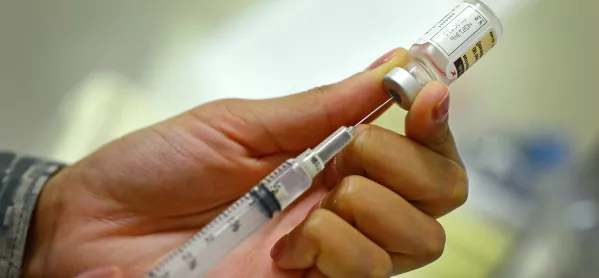Teachers without immunisation against measles have been warned they could be at risk of contracting the disease as more children attend school without being given the MMR vaccine.
Around one in five children didn’t have the vaccine against measles in the early to mid 2000s after medical theories, which have since been discredited, linked it with causing autism.
Professor Helen Bedford, of Great Ormond Street children’s hospital, said the take-up rate was even lower in some areas and that the legacy meant teenagers were now being affected by measles.
Read: Duchess of Cambridge calls for more support for teacher wellbeing
Read: How schools can support pupils with sickle cell disease
Free: Key stage 3 lesson resources on microbes and disease
She said: “Measles is highly infectious, in fact it is considered to be one of the most infectious diseases there is, so it spreads very easily among susceptible people via airborne droplets when infected people cough and sneeze.
“The other aspect of the virus is that it can remain airborne for several hours after an infected person has been in the room. So the classroom is the perfect place for the virus to spread.”
She added: “The measles cases we have been seeing are mainly in teenagers and young adults, mostly arising from importations and then spread in situations where people gather (eg music festivals).”
She also warned that measles in pregnancy can result in miscarriage, pre-term birth, neonatal low birth weight and even maternal death, and that teachers who have not had two doses of MMR are also “at risk” of contracting mumps, and rubella - which is also dangerous for women in the early stages of pregnancy.
Bedford, who is professor of children’s health, said uptake recovered in the mid-to-late 2000s, and that it was “never too late” for adults to have the vaccine also (ideally in two doses and one month apart for best protection).
However, as reported in this week’s Tes magazine, MMR coverage is now at its lowest point for six years and that last year there were more than 900 cases of measles last year compared with around 260 in 2017.
The claim that the MMR vaccine caused autism was made in 1998 by British gastroenterologist Andrew Wakefield, whose theories were later discredited by scientists and who has since been struck off.
Meanwhile, the Association of School and College Leaders (ASCL) said it was “worrying” that the take up of MMR had fallen and that it supported the efforts of public health bodies to promote take-up.
General secretary Geoff Barton said: “We would urge anyone who is concerned that they are not immunised to seek advice from the NHS website.”
You can read more about the rise of measles and how teachers are battling to keep the disease at bay in this week’s Tes magazine, available in all good newsagents. To download the digital edition, Android users can click here and iOS users can click here.




